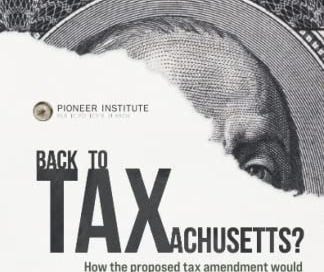In which I look at the Pioneer Institute’s campaign against a ballot proposal to amend the Massachusetts state constitution, and to wander down the route other northeastern states have trod: ever-increasing tax rates on high-income residents, driving them to lower-tax climes.
Episode Links:
Wall Street Journal Op-Ed -
Don’t Make Massachusetts ‘Taxachusetts’ Again by Jim Stergios
Unlike many blue states, Massachusetts has resisted the temptation to raise taxes on high earners. That antitax fortitude is about to be tested. In November state legislators will ask voters to approve an amendment to the Massachusetts constitution adding a 4% surcharge to annual income over $1 million.
Massachusetts is home to arch-progressives like Sen. Elizabeth Warren and Rep. Ayanna Pressley, but many voters here remember the 1980s, when the state was derisively known around the country as "Taxachusetts." A series of antitax popular initiatives in the 1980s and tax cuts enacted by Gov. William Weld in the 1990s reduced Massachusetts' overall state and local tax burden considerably. Proposition 2 1/2, which limits both the levels and growth of property taxes, was approved by voters in 1980 and remains sacrosanct. Among states with income taxes, Massachusetts' flat 5% rate is on the low side. In neighboring Connecticut and New York, the highest earners pay 6.9% and 10.9% respectively.
What was Taxachusetts has become New England's economic dynamo. Since the 2007-09 recession, wage and job growth in Massachusetts has outpaced the nation. Sustained economic growth produced a budget surplus exceeding $5 billion in the past fiscal year, which makes it doubly odd to ask voters to approve a tax hike now.
Their book:
Pioneer Institute’s pages on Back to Taxachusetts
Connecticut’s Revenue Problem as Billionaires Move Away
My earlier posts on Connecticut’s tax revenue issues:
June 2016: No Billionaire Left Behind
Some states have become dependent on their wealthiest tax-payers.
Somehow I think this isn’t happening to Texas or Florida, where they don’t have income tax.
BRIBE THE BILLIONAIRES
This reminds me of the old saying — if you owe the bank $100K but have trouble paying it back, you have a problem. If you owe the bank $100 billion and have trouble paying…. the bank has a problem.
If the state has a lot of rich people/companies it can soak, and you’re a rich person concerned about taxes, you have a problem; if the state finds this revenue source drying up, it has a problem:
….
Almost 100 billionaires in New York, and CT has to hobble along with only 12.
I can see why they have to bribe any of them from leaving with their yummy revenue sources.
May 2015: Public Finance Follies: When You're Too Dependent on Very Few People
The problem is that CT is overly dependent on their coterie of rich people (whether high income, high wealth, or both) for their revenue. Rich people are the most mobile people there are. They may be happy to pay big bucks to live in a pretty house on the shore near a bunch of other rich people, but there are plenty of other places one can go and be rich.
And for all those rich people, CT has been struggling to find economic growth.
….
In any case, Connecticut is so dependent on a very few people for a large portion of their revenue, they keep extremely close tabs on those people:
Connecticut, home to some of the richest Americans, has a big stake in the billions of dollars in revenue their income taxes generate. State tax officials track quarterly estimated payments of 100 high net-worth taxpayers and can tell when payments are down. Of that number, about a half-dozen taxpayers have an effect on revenue that’s noticed in the legislature and the state Department of Revenue Services.
“There are probably a handful of people, five to seven people, who if they just picked up and went, you would see that in the revenue stream,” said Kevin Sullivan, the state’s revenue services commissioner.
That is pretty bad. For one, there is an obvious opportunity for corruption. Those 5-7 people want a special deal/perk that doesn’t come out of the revenue stream? You’d better cater to their wishes.
January 2018: Connecticut Says Bye Bye Billionaires
Lots of people like living in Florida. I don’t like the gators, skeeters, and those hideously large bugs they get, I don’t like breathing in the mush they call air there. But that’s me. I understand some people like sun and warmth.
And Florida has no state income tax.
As the Yankee Institute notes, Connecticut is particularly sensitive to the moves of a few extremely high income people. In a prior post, I wrote about the special state office that keeps very close tabs on the state’s billionaires. And they’ve bribed them to stay.
Some Local Massachusetts Reporting (not finance)
For a bit of fun, some Massachusetts color (this has nothing to do with taxation — just one guy who does local Mass. reporting):
Also from the same reporter:
















Share this post